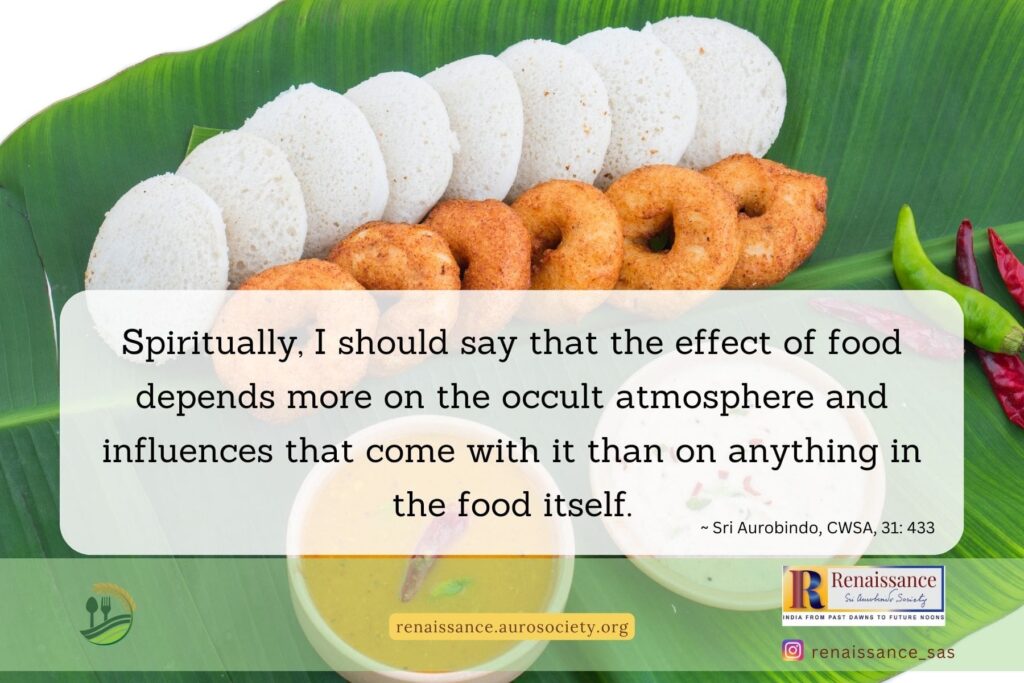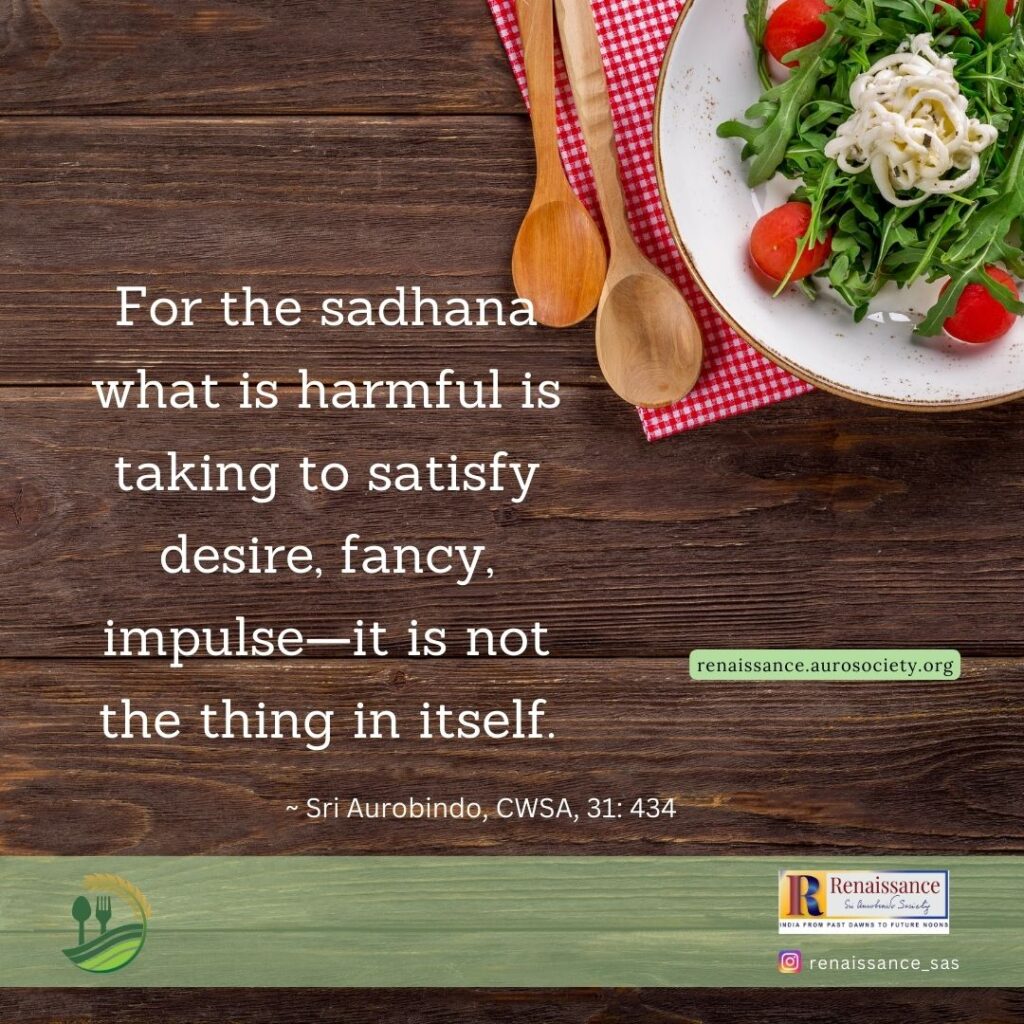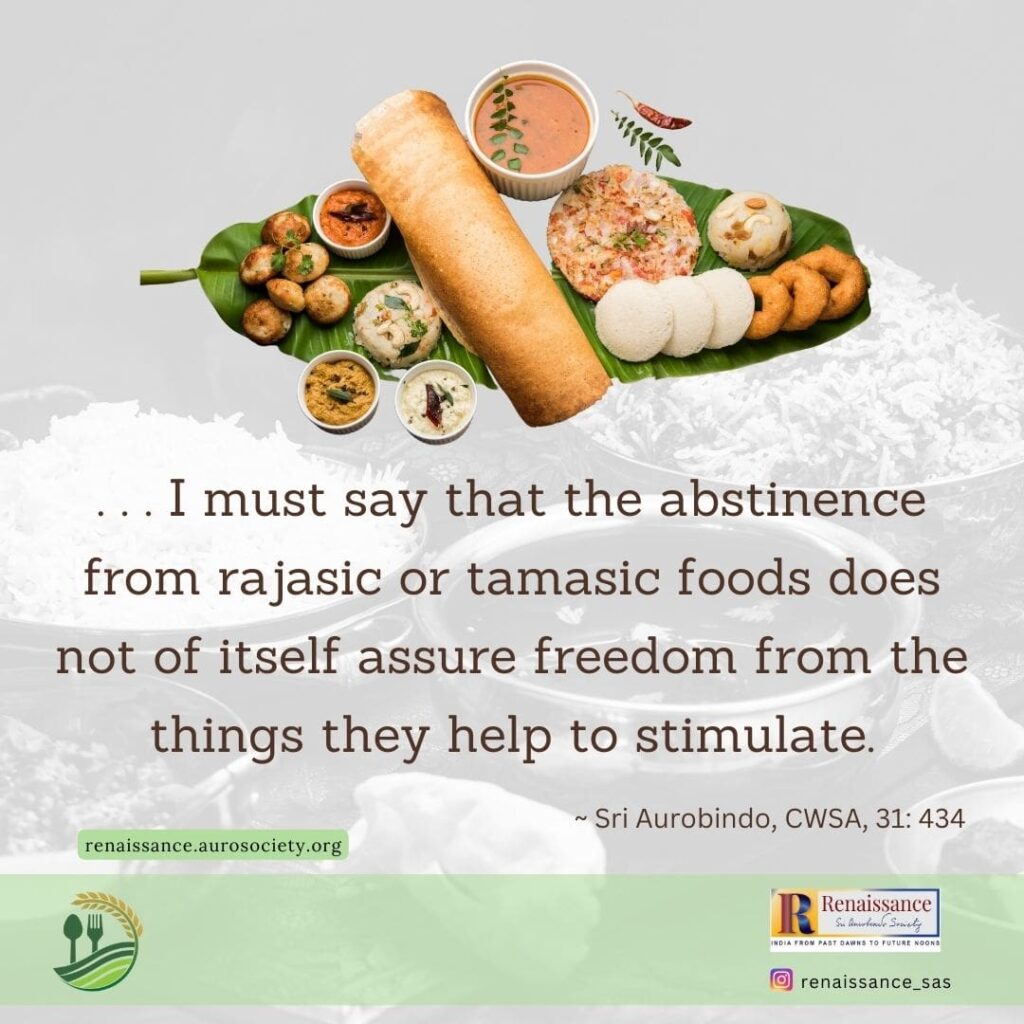Editor’s note: We feature here a few letters of Sri Aurobindo which he wrote in response to some food related queries from the disciples at the Ashram. Some of the queries were about the kinds of food that a spiritual aspirant should avoid.

I think the importance of sattwic food from the spiritual point of view has been exaggerated. Food is rather a question of hygiene and many of the sanctions and prohibitions laid down in ancient religions had more a hygienic than a spiritual motive.
The Gita’s definitions seem to point in the same direction—tamasic food, it seems to say, is what is stale or rotten with the virtue gone out of it, rajasic food is that which is too acrid, pungent etc., heats the blood and spoils the health, sattwic food is what is pleasing, healthy etc.
It may well be that different kinds of food nourish the action of the different gunas and so indirectly are helpful or harmful apart from their physical action. But that is as far as we can confidently go. What particular eatables are or are not sattwic is another question and more difficult to determine.
Spiritually, I should say that the effect of food depends more on the occult atmosphere and influences that come with it than on anything in the food itself.
Vegetarianism is another question altogether; it stands, as you say, on a will not to do harm to the more conscious forms of life for the satisfaction of the belly.

***
Those who are ready to give up animal food, should certainly do so. The others can do it when they are ready.
(This letter was written to someone living outside the Ashram.)
From our archives:
On Vegetarianism, Compassion and Equality
Onions et al
It is rather certain kinds of food that are supposed to increase it [sexual desire]—e.g. meat, onions, chillis etc.
***
It [the chilli] is an aphrodisiac—has a strong effect on the sex centre.
***
If it [taking chillis] is once only in some months it can’t be harmful for the body.
For the sadhana what is harmful is taking to satisfy desire, fancy, impulse—it is not the thing in itself.
***
There is no sin at all in eating these things [onions, potatoes, etc.]. The only objection to eating much onions is that it is supposed to stimulate not tamoguna but rajas, but there are other foods not forbidden that do that.
***

I think onions can be described as rajaso-tamasic in their character. They are heavy and material and at the same time excitant of certain strong material-vital forces.
It is obvious that if one wants to conquer the physical passions and is still very much subject to the body nature and the things that affect it, free indulgence in onions is not advisable. It is only for those who have risen above the body consciousness and mastered it and are not affected by these things that it does not at all matter; for them the use of this or that food or its disuse makes no difference.
At the same time I must say that the abstinence from rajasic or tamasic foods does not of itself assure freedom from the things they help to stimulate.
Vegetarians, for instance, can be as sensual and excitable as meat-eaters; a man may abstain from onions and yet be in these respects no better than before.
It is a change of consciousness that is effective and this kind of abstention helps that only in so far as it tends to create a less heavy and more refined and plastic physical consciousness for the higher will to act upon. That is something, but it is not all; the change of consciousness can come even in spite of non-abstinence.

Onions are allowed here because the palate of the sadhaks demands something to give a taste to the food. We do not insist on these details, or make an absolutely strict rule, as the stress here is more on the inward change, the outward coming as its result.
Only so much is insisted on as is essential for organisation and inner and outer discipline and to point the way to an indispensable self-control. It is pressed on all that the greed of the palate has to be conquered, but it has to be done in the last resort from within, as also the other passions and desires of the lower nature.
READ:
Getting Rid of Desire and Greed for Food
***
Betel is anaesthetic, depressive and yet with a certain toxic effect—that is why it is prohibited.
Whatever is done without purpose is a useless and wrong movement.
Eating things from outside is not safe either from the physical or from the spiritual point of view.
***

Intoxicants
It is the habit in the subconscient material that feels an artificial need created by the past and does not care whether it is harmful or disturbing to the nerves or not. That is the nature of all intoxications (wine, tobacco, cocaine etc.), people go on even after the deleterious effects have shown themselves and even after all real pleasure in it has ceased because of this artificial need (it is not real).
The will has to get hold of this subconscient persistence and dissolve it.
***
Smoking is only a morbid craving of physical desire—there is no other reason for people doing it. Smoking is tamasic and prevents control of mind.
***
These intoxicants [such as bhang] put one in relation with a vital world in which such things [as music and song] exist.



